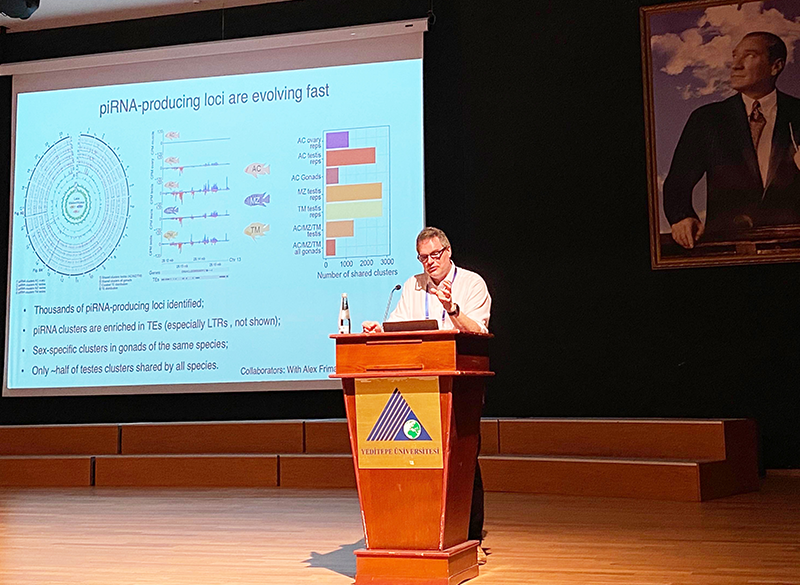Renowned Scientists from Princeton, Cambridge, and Oxford Gather in Istanbul for the Genetics and Bioengineering Congress

A highly anticipated event within the international academic community took place under the auspices of the Yeditepe University Biotechnology Society. The Genetics and Bioengineering Congress brought together prominent researchers from some of the world’s leading universities—including Princeton, Cambridge, Oxford, Kyoto, and KU Leuven—to share their latest scientific work in Istanbul.
The congress attracted hundreds of university students, postgraduate researchers, and academics from across Türkiye, drawing attention for both its high attendance and rich scientific content. Presentations spanned a wide range of topics, from evolutionary biology and epigenetic inheritance to AI-assisted biomedical applications and cancer biology. Participants from pioneering institutions showcased the latest outcomes of their laboratory research at Yeditepe University.
Dr. Naveed Akbar – New Frontiers in Heart Disease
Dr. Naveed Akbar of the University of Oxford discussed how the body initiates self-repair after a heart attack. “We are investigating how the immune system behaves during this healing process. White blood cells, in particular, offer important clues about the extent of cardiac damage and the progress of recovery,” he stated.
Providing insight into intercellular communication, Dr. Akbar added, “Cells inside the body send small packages of information to each other. By decoding these messages, we can detect heart issues much earlier—leading to more accurate and timely diagnoses.”
He also highlighted ongoing research into how diabetic patients’ immune systems respond to cardiac events. “In individuals with diabetes, the immune system may function differently, which can affect heart recovery. Understanding this process better could lead to the development of personalized treatments.”
Dr. Eleonora Leucci – Unmasking Cancer
Dr. Eleonora Leucci from KU Leuven, Belgium, drew attention with her research into cancer’s resistance to treatment. She emphasized the role of specific molecules—often overlooked—that allow cancer cells to evade immune detection.
Focusing particularly on melanoma (skin cancer), Dr. Leucci discussed how molecules known as “Rosalind” and “LISRR” render cancer cells virtually invisible. “If we can target these structures, we may be able to ‘unmask’ cancer and make treatments more effective,” she said. According to Dr. Leucci, this discovery may pave the way for entirely new approaches in cancer therapy.
Prof. Dr. Michael S. Levine – The Evolution of Vertebrates
Prof. Dr. Michael S. Levine of Princeton University, a global authority in evolutionary developmental biology, delivered a talk titled “How Did the Vertebrate Head Evolve?” He illustrated how genes responsible for the development of the head and nervous system have evolved from simpler organisms to complex vertebrates like fish and birds. Using genetic insights, he explored the evolutionary progression of major systems within the head.
Prof. Dr. Cantas Alev – EMBRYONIC DEVELOPMENT ENTERS THE DIGITAL AGE
Prof. Dr. Cantas Alev of Kyoto University investigates why embryonic development progresses at different speeds in different individuals. With the aid of artificial intelligence, researchers can now analyze embryonic development in a digital environment. Prof. Dr. Alev noted that this has enabled clearer observations of how genes function and how cells communicate—contributing to better understanding of disease mechanisms and new therapeutic approaches.
Prof. Dr. Eric Miska – The Boundaries of Epigenetic Inheritance
Epigenetics—the study of heritable changes in gene expression without alterations to the DNA sequence—has gained increasing attention in recent years. Prof. Dr. Eric Miska of the University of Cambridge shared how factors such as lifestyle, environmental exposure, and intracellular molecules shape gene expression beyond traditional inheritance.
He also introduced “transposons”—mobile genetic elements that can move within the genome. These particles can cause dramatic shifts in gene function, sometimes yielding beneficial cellular changes, but also potentially contributing to disease.
The Genetics and Bioengineering Congress offered a unique opportunity for young researchers to engage directly with leading scientists from around the world. In addition to keynote presentations, participants took part in workshops, Q&A sessions, and one-on-one meetings—fostering direct academic exchange and inspiration.